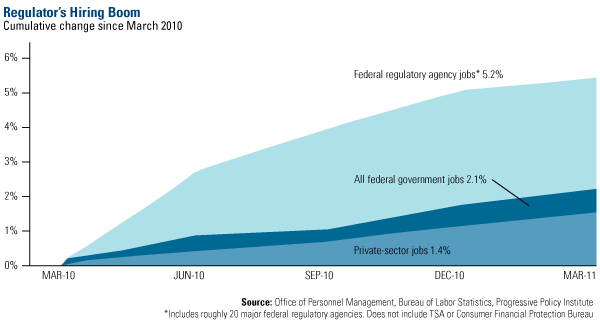In the last 30 months, the Obama administration has created a psychological landscape that finally just seemed, whether fairly or not, too hostile to most employers to risk new hiring and buying. Each act, in and of itself, was irrelevant. Together they are proving catastrophic and doing the near impossible of turning a brief recovery into another recession.
Here is the lament I heard: the near $5 trillion in borrowing in just three years, the radical growth in the size of the federal government and its regulatory zeal, ObamaCare, the Boeing plant closure threat, the green jobs sweet-heart deals and Van Jones-like “Millions of Green Jobs” nonsense, the vast expansion in food stamps and unemployment pay-outs, the reversal of the Chrysler creditors, politically driven interference in the car industry, the failed efforts to get card check and cap and trade, the moratoria on new drilling in the Gulf, the general antipathy to new fossil fuel exploitation coupled with new finds of vast new reserves, the new financial regulations, an aggressive EPA oblivious to the effects of its advocacy on jobs, the threatened close-down of energy plants, the support for idling thousands of acres of irrigated farmland due to environmental regulations, the constant talk of higher taxes, the needlessly provocative rhetoric of “fat cat”, “millionaires and billionaires,” “corporate jet owners,” etc. juxtaposed, in hypocritical fashion, to Martha’s Vineyard, Costa del Sol, and Vail First Family getaways — all of these isolated strains finally are becoming a harrowing opera to business people.
Despite enormous opportunity for many cash-rich firms to take advantage of the down cycles (low interest, plentiful potential employees, discounted prices, etc.), they are taking a pass, almost as if to collectively sigh, “This bunch doesn’t like me much and I’m going to hunker down, hoard my cash, and sit out the next year and a half until they are gone.” And the administration’s efforts to counteract these symbols and impressions by courting a high-profile, hyper-capitalist Warren Buffett, or a GE CEO Jeffrey Immelt have proven even more ironic: the former calls for higher taxes that his firms seek to avoid, or targets his post-mortem wealth to (more efficient?) private foundations that rob the Treasury of billions in lost inheritance taxes, or knows higher taxes won’t much matter to his tens of billions in net worth; the latter’s firm paid no 2010 U.S. income taxes on many of its profits and outsourced jobs overseas.

